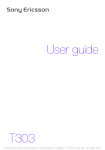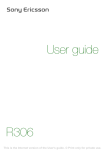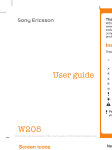Download Sony Spiro W100i 90g Black
Transcript
Sony Ericsson Spiro™ User guide This is the Internet version of the User guide. © Print only for private use. Important information Please read the Important information leaflet before you use your mobile phone. Experience more. Discover how. Fill it with pop and let it rock. Share your life in pictures. Or why not go online for the latest updates? Your new phone is the key to a wider world. And it's just around the corner. Get started with this User guide. And join us online to get the full picture. Music, games, apps, updates, downloads, support and more. All in one place: www.sonyericsson.com/spiro Feedback on the User guide Do you have any suggestions on how we can improve this User guide? If so, then email us at [email protected]. Please make sure to type the User guide name in the email subject field. We highly value your feedback! 2 This is the Internet version of the User guide. © Print only for private use. Getting started SIM card The SIM (Subscriber Identity Module) card, which you get from your network operator, contains information about your subscription. Always turn off your phone and detach the charger and battery (if inserted) before you insert or remove the SIM card. PIN You may need a PIN (Personal Identification Number) to activate the services and functions in your phone. Your PIN is supplied by your network operator. Each PIN digit appears as *, unless it starts with emergency number digits such as 112 or 911. You can see and call an emergency number without entering a PIN, if a network is available. If you enter the wrong PIN three times in a row, the SIM card is blocked. See SIM card lock on page 33. 3 This is the Internet version of the User guide. © Print only for private use. To insert the SIM card 1 Remove the battery cover. 2 Slide the SIM card into its holder with the gold-coloured contacts facing down. 4 This is the Internet version of the User guide. © Print only for private use. To insert the battery 1 Insert the battery with the label side up and the connectors facing each other. 2 Slide the battery cover into place and lock it. Turning on the phone To turn on the phone 1 Press and hold down . 2 Open the slider and enter your PIN, if requested. 3 Select OK. 4 Select a language. 5 This is the Internet version of the User guide. © Print only for private use. 5 Select Yes to use the setup wizard. If you make a mistake when you enter your PIN, you can press to delete numbers from the screen. Standby After you have turned on the phone and entered your PIN, the name of the network operator appears. This view is called standby. You phone is now ready for use. To turn off the phone • Press and hold down . Before turning off the phone, you must return to standby. Memory card You may have to purchase a memory card separately. Your phone supports a microSD™ memory card, adding more storage space to your phone. This type of card can also be used as a portable memory card with other compatible devices. You can move content between a memory card and the phone memory. 6 This is the Internet version of the User guide. © Print only for private use. To insert a memory card • Remove the battery cover and insert the memory card with the gold-coloured contacts facing down. To remove a memory card • Remove the battery cover and slide the memory card to remove it. 7 This is the Internet version of the User guide. © Print only for private use. Phone overview 1 Ear speaker 2 Screen 3 Connector for charger and USB cable 4 Selection keys 5 Call key 6 Shortcut key 7 Navigation key, Walkman™ player controls, TrackID™* 8 End key, On/off key 9 C key (Clear) 1 2 3 4 5 6 8 9 10 Silent key 7 10 8 This is the Internet version of the User guide. © Print only for private use. 11 11 Connector for handsfree 12 Camera lens 12 13 Volume key 14 Loudspeaker 13 14 *The TrackID™ shortcut key may not be available in your phone. 9 This is the Internet version of the User guide. © Print only for private use. Screen icons These icons may appear on the screen. Icon Description Missed call Handsfree connected Ongoing call Text message received Multimedia message received Predictive text input activated Phone set to silent Radio playing Alarm activated Bluetooth™ function activated 10 This is the Internet version of the User guide. © Print only for private use. To charge the battery • Connect the charger to the phone with the power icon on the charger facing upwards. It takes approximately 2.5 hours to fully charge the battery. You can still use your phone while it is charging. The phone battery is partly charged when you buy it. It may take a few minutes before the battery icon appears on the screen. The battery will start to discharge a little after it is fully charged and then charges again after a certain time. This is to extend battery life and may result in the charge status showing a level below 100 percent. 11 This is the Internet version of the User guide. © Print only for private use. Menu overview PlayNow™ Entertainment Alarms Online services*, PlayNow™, Radio, Games, TrackID™, Record sound Calls** Media Camera All, Answered, Dialled, Missed Internet WALKMAN Settings** Messaging General, Sounds & alerts, Display, Calls, Connectivity Contacts * Some menus are operator-, network- and subscription-dependent. ** You can use the navigation key to scroll between tabs in submenus. Write new, Inbox/ Conversations, Messages, Call voicemail Organiser File manager**, Applications, Torch, Calendar, Tasks, Notes, Timer, Stopwatch, Calculator 12 This is the Internet version of the User guide. © Print only for private use. Navigation The main menus are shown as icons. Some submenus include tabs. To access the main menu • When Menu appears on the screen, press the centre selection key. • When Menu does not appear on the screen, press the End key, then press the centre selection key. To navigate the phone menus 1 Press the centre selection key to select Menu. 2 Press the navigation key upwards, downwards, left or right to move through the menus. To select an item • Scroll to the item and press the centre selection key To scroll between tabs • Press the navigation key left or right . To go back one step in a menu • Select Back. 13 This is the Internet version of the User guide. © Print only for private use. To end a function • Press . To return to standby • Press . To delete an item • Scroll to the item and press . Shortcuts You can use the navigation key shortcuts from standby or use the shortcut menu to get quick access to certain functions. To use navigation key shortcuts • Press the navigation key upwards, downwards, left or right to go directly to a function. To edit a navigation key shortcut • Select Menu > Settings > General > Shortcuts. The WALKMAN shortcut cannot be changed. To open the shortcut menu • Press . To add a shortcut 1 Press . 2 Scroll to New shortcut and select Add. To delete or move a shortcut 1 Press . 2 Scroll to a shortcut and select Options. 3 Select an option. To turn the sound on or off • Press and hold down . 14 This is the Internet version of the User guide. © Print only for private use. Entering text You can use multitap text input or Zi™ text input to enter text. The Zi text input method uses a built-in dictionary. By using Zi text input you only have to press each key once. Continue writing a word even if it appears to be wrong. To enter text using Zi text input 1 For example, to write the word “Jane”, press , , , . 2 You now have several options: • If the word shown is the one you want, press to accept and add a space. To accept a word without adding a space, press the navigation key right. • If the word shown is not the one you want, press the navigation key upwards or downwards to view alternative words. To accept a word and add a space, . press • To enter full stops and commas, press and press the navigation key to scroll to the punctuation desired. To enter text using multitap • Press – until the character you want appears. • Press to add a space. • Press to enter punctuation marks. To use shortcuts and keys when entering text • To change the text input method, press and hold down . • To change writing language, press and hold down . • To shift between upper-case letters, lower-case letters, and numbers, press . 15 This is the Internet version of the User guide. © Print only for private use. • To delete characters, press . • To delete a whole word, press and hold down • To enter numbers, press and hold down – . . To add a word to the dictionary 1 When you enter text using Zi text input, select Options > Spell word. 2 Enter the word using multitap and select Save. Calling You must turn on the phone and be within range of a network. To make a call 1 Enter a phone number (with international country code and area code, if applicable). 2 Press . You can call numbers from Contacts and from the call list. See Contacts on page 18, and Call list on page 17. To end a call • Press . To answer a call • Press . To reject a call • Press . To change the ear speaker volume during a call • Press the volume key up or down. 16 This is the Internet version of the User guide. © Print only for private use. To turn off the ringtone without answering a call • Press the volume key up or down. To turn on the loudspeaker during a call • Select Spkr on. Do not hold the phone to your ear when using the loudspeaker. This could damage your hearing. To make an international call 1 Press and hold down until a “+” sign appears. 2 Enter the country code, area code (without the first zero) and phone number. 3 Press . Call list You can view information about recent calls. To call a number from the call list 1 Press . 2 Scroll to a name or a number and press . To clear the call list 1 Press . 2 In the All tab, select Options > Delete all. 3 To confirm, select Yes. Emergency calls Your phone supports international emergency numbers, for example, 112 or 911. You can normally use these numbers to make emergency calls in any country, with or without the SIM card inserted, if you are within range of a network. 17 This is the Internet version of the User guide. © Print only for private use. To make an emergency call • Enter 112 (the international emergency number) and press . In some countries, other local emergency numbers may also be promoted. Your network operator may have saved these numbers on the SIM card. Contacts You can save names, phone numbers and personal information in Contacts. Information can be saved in the phone memory or on the SIM card. To add a phone contact 1 Select Menu > Contacts. 2 Scroll to New contact and select Add. 3 Enter the name and select OK. 4 Scroll to New number: and select Add. 5 Enter the number and select OK. 6 Select a number option. 7 Scroll between the tabs and add information to the fields. 8 Select Save. To edit a phone contact 1 Select Contacts. 2 Scroll to a contact and select Options > Edit contact. 3 Scroll between the tabs, edit information and select Save. 18 This is the Internet version of the User guide. © Print only for private use. Calling contacts To make a call using Smart search 1 Press – to enter a sequence of (at least two) digits. All entries that match the sequence of digits or corresponding letters are shown in a list. 2 Scroll to a contact or a phone number and press the Call key. To turn on or off Smart search 1 Select Menu > Settings > Calls > Smart search. 2 Select an option. Messaging Text messages You must have a valid service centre number in your phone. This is supplied by your service provider and saved on the SIM card. You may have to enter the number yourself. To write and send a text message 1 Select Menu > Messaging > Write new > Message. 2 Write the message and select Continue. Select Contacts look-up or Enter phone number. 3 Select a recipient and select Send. To view a received text message • When From: Text message received Read now? appears, select Yes. To view messages from the Inbox 1 Select Menu > Messaging > Inbox. 2 Scroll to a message and select View. 19 This is the Internet version of the User guide. © Print only for private use. Multimedia messages Multimedia messages can contain text, pictures, sound and attachments. They are sent using MMS (Multimedia Messaging Service) to a mobile phone. You need the correct Internet settings in your phone to use multimedia messaging. See Internet on page 30. You must set an MMS profile and the address of your message server. If no MMS profile or message server exists, you can receive all the settings from your network operator or at www.sonyericsson.com/support. To send a multimedia message 1 Select Menu > Messaging > Write new > Message. 2 Enter text. To add items to the message, press the navigation key downwards, then scroll left or right and select an item. 3 To preview the multimedia message before sending it, select Options > Preview. 4 When the message is ready, select Continue. 5 Select Contacts look-up and select a recipient. 6 Select Send. You can only send multimedia messages if both the sending and receiving phones have subscriptions that support MMS. Conversations You can choose whether to view your messages in Conversations or the Inbox. A messaging conversation shows all messaging communication between you and one of your contacts. 20 This is the Internet version of the User guide. © Print only for private use. To send a message from Conversations 1 Select Menu > Messaging. 2 Select Conversations, or select Inbox > the Conversations tab. 3 Select a conversation. 4 Write a message and select Send. To view messages in Conversations • Select Menu > Messaging > Inbox > the Conversations tab and select a conversation. • Select Menu > Messaging > Conversations and select a conversation. Walkman™ To play music 1 Press and select Options > My music. 2 Browse by artist, album, track or playlist. Scroll to an option and press Select to open it. 3 Scroll to a track and select Play. To stop playing music • When a track is playing, press . Transferring music You can transfer music from your computer to your phone memory or memory card. There are two ways to connect the phone to a computer: • using a USB cable • using a Bluetooth™ wireless technology connection You can drag and drop files between your phone or memory card and a computer in Microsoft® Windows® Explorer. For 21 This is the Internet version of the User guide. © Print only for private use. more information about transferring files to your phone go to www.sonyericsson.com/support. You may have to purchase a USB cable separately. To connect your phone to a computer using a USB cable 1 Make sure your phone is turned on. 2 Connect the USB cable to your phone and the computer. 3 Phone: select Mass storage. 4 Computer: Wait for the drivers to be installed (this is done automatically). The first time you connect your phone to the computer, you may need to identify and name the phone. To transfer files in Mass storage mode using a USB cable Do not remove the USB cable from the phone or computer during transfer, as this may corrupt the memory card and the phone memory. You cannot view the transferred files in your phone until you have removed the USB cable from the phone. 1 Connect the USB cable to the phone and the computer. 2 Phone: Select Mass storage. 3 Computer: Wait until the phone memory and memory card appear as external disks in Microsoft®Windows® Explorer. 4 Computer: On the computer desktop, double-click the My Computer icon. 5 Computer: To view the phone memory and memory card folders, double-click the icon representing your phone. 6 Computer: Copy and paste your file, or drag and drop it, into a folder on your computer, in your phone memory, or on your memory card. 22 This is the Internet version of the User guide. © Print only for private use. 7 To safely disconnect the USB cable, right-click the Removable Disk icon in Windows Explorer and select Eject. Playlists You can create playlists to organise your music. To create a playlist 1 Press and select Options > My music > Playlists > New playlist. 2 Enter a name and select OK. 3 Scroll to a track and select Mark. 4 Select Add to add the track to the playlist. Repeat steps 3 and 4 to add more tracks. To add tracks to a playlist 1 Press and select Options > My music > My Playlists. 2 Open a playlist and select Options > Add media. 3 Mark the desired tracks and select Add. You can also add all the tracks in a folder to a playlist by marking the folder and then selecting Options > Add. To remove tracks from a playlist 1 Press and select Options > My music > My Playlists. 2 Open a playlist and scroll to a track. 3 Press and select Yes. To control the Walkman™ player • Press to open the Walkman™ player. • Press to play or stop the current music file. • Press to go to the next music file. 23 This is the Internet version of the User guide. © Print only for private use. • Press to go to the previous music file. • Press and hold down or to fast forward or rewind. • Press the navigation key upwards/downwards to view and scroll files in the current playlist. • Press the volume key up or down to change the volume. • Select Back to minimise the Walkman™ player during playback. TrackID™ TrackID™ is a music recognition service. You can search the title, artist and album name for a track you hear playing through a loudspeaker or on the radio. You need the correct Java™ software and Internet settings in your phone to use this function. See Internet on page 30. For cost information contact your service provider. To search for track information • When you hear a track through a loudspeaker, select Menu > Entertainment > TrackID™ > Start. • When you hear a track through the radio on your phone, from the radio view select Options > TrackID™. PlayNow™ When you open PlayNow™ , you enter PlayNow™, where you can download music, games, ringtones, themes and 24 This is the Internet version of the User guide. © Print only for private use. wallpapers. You can preview or listen to content before you purchase and download it to your phone. This service is not available in all countries. For extended functionality, you can also access the PlayNow™ web shop on a computer from www.sonyericsson.com/playnow. For more information, go to www.sonyericsson.com/support to read the PlayNow™ Feature guide. You can access PlayNow™ in two ways: • From standby, select Menu > PlayNow™. • Go to www.sonyericsson.com/playnow. Video player You can view and manage video clips in your phone. To view a video clip 1 Select Menu > Media > Video. 2 Scroll to a video clip and select Play. Radio You can listen to the radio in your phone by connecting the phone to a handsfree device. The handsfree works as an antenna. 25 This is the Internet version of the User guide. © Print only for private use. In some markets, you may have to purchase the handsfree separately. Do not use your phone as a radio in places where this is prohibited. To turn on the radio 1 Connect a handsfree to the phone. 2 Select Menu > Entertainment > Radio. To search for channels automatically • When the radio is playing, select Search. To search for channels manually • When the radio is playing, press the navigation key left or right. 26 This is the Internet version of the User guide. © Print only for private use. Imaging Camera and video recorder You can take photos and record video clips to view, save or send. Photos and video clips are automatically saved in the phone memory. You can save photos and video clips on a memory card by selecting Camera > Options > Save to > Memory card. To take a photo 1 Select Camera and press the navigation key left to switch to . 2 Select TakePic. The photo is automatically saved in JPEG format. To avoid a blurred photo, use a support or the selftimer. To change camera settings 1 Select Camera > Options. 2 Select an item and change the relevant settings. To send a saved photo 1 Select Menu > Organiser > File manager > Camera album. 2 Scroll to a photo and select Options > Send. 3 Select an option. See To send an item using the Bluetooth™ function on page 30. See To send a multimedia message on page 20. 27 This is the Internet version of the User guide. © Print only for private use. To record a video clip 1 Select Camera and press the navigation key right to switch to . 2 Select Record to start recording. 3 To stop recording, select Stop. The video clip is automatically saved. Do not record with a strong light source in the background. To view video clips 1 Select Menu > Organiser > File manager > Videos. 2 Scroll to a video clip and select Play. Transferring photos and video clips You can use Bluetooth™ wireless technology and the USB cable to transfer photos and video clips between your computer and phone. For more information, see Bluetooth™ wireless technology on page 28 and To transfer files in Mass storage mode using a USB cable on page 22. Bluetooth™ wireless technology Bluetooth™ wireless technology facilitates wireless connections to other Bluetooth™ devices, for example, a Bluetooth™ headset. You can connect to several devices at the same time or exchange items. A range within 10 metres (33 feet), with no solid objects in between, is recommended for Bluetooth™ communication. 28 This is the Internet version of the User guide. © Print only for private use. To turn on the Bluetooth™ function • Select Menu > Settings > Connectivity > Bluetooth > Turn on. Some countries do not allow you to use Bluetooth™ wireless technology. To show or hide your phone • Select Menu > Settings > Connectivity > Bluetooth > Visibility > Show phone or Hide phone. If you select Hide phone, other devices will not be able to identify your phone using Bluetooth™ wireless technology. To pair the phone with a device 1 To search for available devices, select Menu > Settings > Connectivity > Bluetooth > My devices > New device. 2 Select a device from the list. 3 Enter a passcode, if required. Make sure that the device you want to pair your phone with has the Bluetooth™ function activated and Bluetooth™ visibility set to Show phone. To pair the phone with a Bluetooth™ handsfree 1 Select Menu > Settings. 2 Press the navigation key right to scroll to the Connectivity tab and select Bluetooth > Handsfree > My handsfree > New handsfree. To receive an item 1 Turn on the Bluetooth™ function and set the Visibility to Show phone. 29 This is the Internet version of the User guide. © Print only for private use. 2 When you receive an item, follow the instructions that appear. To send an item using the Bluetooth™ function 1 Select, for example, Menu > Organiser > File manager > Camera album. 2 Scroll to an item and select Options > Send > Via Bluetooth. Internet You need the correct Internet settings in your phone. If the settings are not in your phone, you can go to www.sonyericsson.com/support or ask your service provider for more information. Make sure you have a phone subscription that supports data transmission. To select an Internet profile 1 Select Menu > Settings > Connectivity > Internet settings > Internet profiles > Connect using:. 2 Select an account. To start browsing 1 Select Menu > Internet > Options > Go to. 2 Select an option. To exit the browser • When you are browsing, press . 30 This is the Internet version of the User guide. © Print only for private use. More features File manager You can handle files saved in the phone memory or on a memory card. You can create subfolders where you can save your files. To view information about a file 1 Select Menu > Organiser > File manager. 2 Select the file from a folder and select Options > Information. To copy or move a file in File manager 1 Select Menu > Organiser > File manager. 2 Find a file in a folder and select Options > Manage file. 3 Select Copy or Move. To view the memory status • Select Menu > Organiser > File manager > Options > Memory status. Voicemail If your subscription includes an answering service, callers can leave a voicemail message when you cannot answer a call. To enter your voicemail number 1 Select Menu > Messaging > Messages > Settings > Voicemail number. 2 Enter the voicemail number you received from your service provider and select Save. To call your voicemail service • Press and hold down . 31 This is the Internet version of the User guide. © Print only for private use. Alarms You can set a sound or the radio as an alarm signal. The alarm sounds even if the phone is turned off. To set the alarm 1 Select Menu > Alarms. 2 Scroll to an alarm and select Edit. 3 Switch among the tabs and set the time, the alarm signal and other information if needed. 4 Select Save. Keep the handsfree inserted when you select the radio as your alarm signal. The radio alarm sounds through the loudspeaker. To silence the alarm 1 When the alarm sounds, press any key. 2 To repeat the alarm, select Snooze. Ringtones and wallpapers Wallpapers are used to change the appearance of the screen. To set the ringtone volume 1 Select Menu > Settings > Sounds & alerts > Ring volume. 2 Press the navigation key left or right to change the volume. 3 Select Save. To set a ringtone 1 Select Menu > Settings > Sounds & alerts > Ringtone. 2 Find and select a ringtone. 32 This is the Internet version of the User guide. © Print only for private use. To set the vibrating alert 1 Select Menu > Settings > Sounds & alerts > Vibrating alert. 2 Select an option. To use a photo as wallpaper 1 Select Menu > Organiser > File manager > Camera album. 2 Scroll to a picture and select Options > Use as > Wallpaper. Keypad lock You can use the keypad lock to avoid accidental dialling. Incoming calls can be answered without unlocking the keypad. Calls to the international emergency number 112 can still be made. To activate the automatic keylock 1 Select Menu > Settings > General > Security > Automatic keylock. 2 Select an option. SIM card lock This lock only protects your subscription. Your phone will work with a new SIM card. If the SIM card lock is on, you have to enter a PIN when the phone starts up. If you enter your PIN incorrectly three times in a row, the SIM card is blocked and you need to enter your PUK (Personal Unblocking Key). Your PIN and PUK are supplied by your network operator. 33 This is the Internet version of the User guide. © Print only for private use. To unblock the SIM card 1 When PIN blocked. To unblock, enter your PUK code provided by your network operator. is displayed, enter your PUK and select OK. 2 Enter a new PIN and select OK. 3 To confirm, re-enter the new PIN and select OK. To activate the SIM card lock 1 Select Menu > Settings > General > Security > SIM protection > Protection > On. 2 Enter your PIN and select OK. To edit the PIN 1 Select Menu > Settings > General > Security > SIM protection > Change PIN. 2 Enter your PIN and select OK. 3 Enter a new PIN and select OK. 4 To confirm, re-enter the new PIN and select OK. Phone lock The phone lock protects the phone against unauthorised use if it is stolen and the SIM card is exchanged. You can change the phone lock code (which is 0000 by default) to any four-to-eight-digit personal code. If the phone lock is set to Automatic, you do not need to enter your phone lock code until a different SIM card is inserted in the phone. To set the phone lock 1 Select Menu > Settings > General > Security > Phone protection > Protection. 2 Select an option. 3 Enter the phone lock code and select OK. 34 This is the Internet version of the User guide. © Print only for private use. To change the phone lock code 1 Select Menu > Settings > General > Security > Phone protection > Change code. 2 Enter the old code and select OK. 3 Enter the new code and select OK. 4 Repeat the new code and select OK. To turn off phone lock protection 1 Select Menu > Settings > General > Security > Phone protection > Protection > Off. 2 Enter your phone lock code and select OK. Troubleshooting Some problems require you to call your network operator, but you can correct most problems yourself. Remove the SIM card before handing your phone in for repair. For more support, go to www.sonyericsson.com/support. Restart your phone every day to free memory. Do a Master reset if you are having problems with memory capacity or if the phone is working slowly. Master reset If you experience problems with your phone, such as screen flickering, screen freezing or navigation problems, you should reset the phone. To reset the phone • Select Menu > Settings > General > Master reset and select an option. Reset settings resets all changes that you have made in your phone to default. Reset all deletes all user data 35 This is the Internet version of the User guide. © Print only for private use. such as contacts, messages, pictures and sounds in your phone. Legal information Sony Ericsson W100i/W100a This User guide is published by Sony Ericsson Mobile Communications AB or its local affiliated company, without any warranty. Improvements and changes to this User guide necessitated by typographical errors, inaccuracies of current information, or improvements to programs and/ or equipment, may be made by Sony Ericsson Mobile Communications AB at any time and without notice. Such changes will, however, be incorporated into new editions of this User guide. All rights reserved. ©Sony Ericsson Mobile Communications AB, 2010 Publication number: 1232-5356.3 Your mobile phone has the capability to download, store and forward additional content, e.g. ringtones. The use of such content may be restricted or prohibited by rights of third parties, including but not limited to restriction under applicable copyright laws. You, and not Sony Ericsson, are entirely responsible for additional content that you download to or forward from your mobile phone. Prior to your use of any additional content, please verify that your intended use is properly licensed or is otherwise authorized. Sony Ericsson does not guarantee the accuracy, integrity or quality of any additional content or any other third party content. Under no circumstances will Sony Ericsson be liable in any way for your improper use of additional content or other third party content. Bluetooth is a trademark or a registered trademark of Bluetooth SIG Inc. and any use of such mark by Sony Ericsson is under license. The Liquid Identity and Liquid Energy logos, PlayNow and TrackID are trademarks or registered trademarks of Sony Ericsson Mobile Communications AB. Sony, Walkman, the WALKMAN logo, and "make.believe" are trademarks or registered trademarks of Sony Corporation. microSD is a trademark or a registered trademark of SanDisk Corporation. 36 This is the Internet version of the User guide. © Print only for private use. Java and all Java based trademarks and logos are trademarks or registered trademarks of Sun Microsystems, Inc. In the United States and other countries. TrackID™ is powered by Gracenote™ Mobile MusicID™. Gracenote and Mobile MusicID are trademarks or registered trademarks of Gracenote, Inc. Zi is a trademark or registered trademark of Zi Corporation of Canada, Inc. Ericsson is a trademark or registered trademark of Telefonaktiebolaget LM Ericsson. Microsoft and Windows are registered trademarks or trademarks of Microsoft Corporation in the United States and/or other countries. This product is protected by certain intellectual property rights of Microsoft. Use or distribution of such technology outside of this product is prohibited without a license from Microsoft. Other product and company names mentioned herein may be the trademarks of their respective owners. Any rights not expressly granted herein are reserved. All illustrations are for illustration only and may not accurately depict the actual phone. 37 This is the Internet version of the User guide. © Print only for private use. www.sonyericsson.com Sony Ericsson Mobile Communications AB SE-221 88 Lund, Sweden 1232-5356.3 This is the Internet version of the User guide. © Print only for private use.

















































